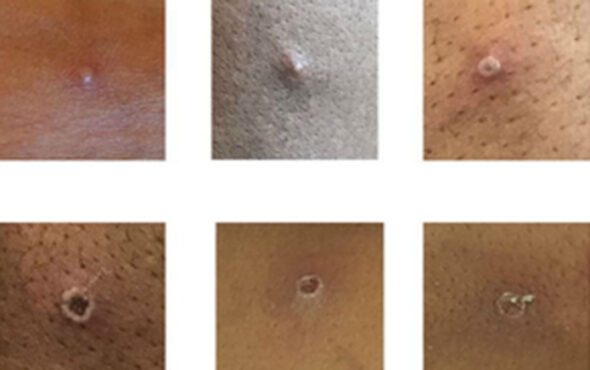
Four new cases of monkeypox have been identified in the UK, all of which are among gay, bisexual or other men who have sex with men (MSM).
The UK Health Security Agency (UKHSA) said that all appear to have been infected in London, but that investigations are underway and common contacts have been identified in two of the four latest infections.
“There is no link to travel to a country where monkeypox is endemic, and exactly where and how they acquired their infections remains under urgent investigation, including whether they have further links to each other,” the UKHSA said in its latest update on 16 May.
Those needing medical care are all currently getting it in specialist infectious disease units, with all four cases having the West African clade of the virus, which is mild in comparison to the Central African one.
Two of the four cases know each other, the health agency also confirmed.
Due to the virus not spreading easily, the UK population is not believed to be at risk at this time.
However, because of the latest cases all being among gay, bisexual and other MSM, the UKHSA is advising that people who fall into these categories pay close attention to “any unusual rashes or lesions on any part of their body, especially their genitalia, and to contact a sexual health service if they have concerns.”
Those with these worries are asked to get in touch with the clinic or surgery ahead of a visit.
Monkeypox is a viral infection which tends to be a mild self-limiting illness, with most people taking just a few weeks to recover.
Early symptoms include a fever, headache, muscle aches, backache, swollen lymph nodes, chills and exhaustion.
It is also possible for a rash to develop, which often begins on the face before spreading to other parts of the body, including the genitals.
Monkeypox is most commonly spread by wild animals and to catch it from another person is incredibly difficult, but can happen through touching something used by someone with the rash, touching monkeypox skin blisters or scabs, or from the coughs or sneezes of a person with the rash, according to the NHS.
“This is rare and unusual. UKHSA is rapidly investigating the source of these infections because the evidence suggests that there may be transmission of the monkeypox virus in the community, spread by close contact,” said Dr Susan Hopkins, the UKHSA’s Chief Medical Adviser.
The latest four cases mean that there are currently seven confirmed cases in the UK, diagnosed between 6 and 15 May.
Washing your hands with soap and water regularly, using an alcohol-based hand sanitiser and only eating meat that has been cooked thoroughly are the main three things you can do to reduce the risk of catching monkeypox.
More information is available here.



